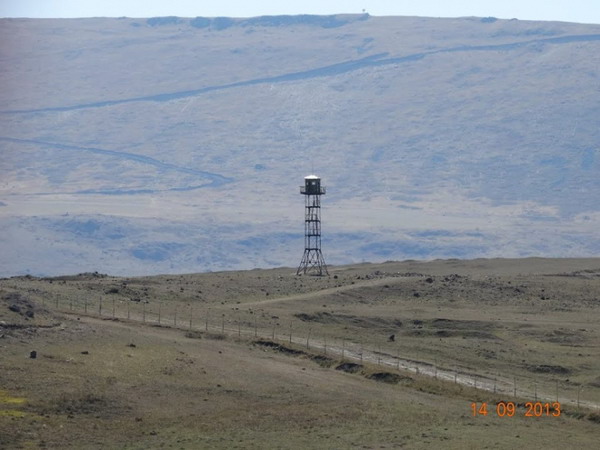At the Angelus of last July 19, Pope Francis said he was following with concern “the worsening of armed tensions in the regions of the Caucasus, between Armenia and Azerbaijan”, and asked for the commitment of the international community so that “a lasting peaceful solution can be reached”.
The appeal stemmed from an escalation on the border between Azerbaijan and Armenia. The Azeris first tried to take a position in Armenian territory on 12 July, which was followed by various skirmishes which resulted in actual artillery attacks on 16 July. According to other reconstructions, the Armenians have instead tried to take advantageous positions. However, the escalation caused 16 victims.
In a comment sent to ACI Stampa, the Azerbaijani Embassy to the Holy See accuses Armenia of a continued use of the attacks to take “advantageous positions”, and argues that everything is has started due to provocations to against the sovereignty of Azerbaijan, as well as to cover the mismanagement by the government of the COVID emergency.
The Azerbaijan Embassy to the Holy See also links the issue to an energy supply issue. It stresses in the statement that there are three oil pipelines departing from Baku (towards Soupsa; towards Tbilisi-Ceyhan; towards Tbilisi Erzurum) and this “has allowed Baku to considerably strengthen the energy security of its partners in the region, Georgia and the Turkey”.
Read also
The embassy also notes that “currently, with the active financial support of Azerbaijan (which brought 10 billion out of a total of 30 billion), the South Gaz Corridor is being built, a project of pan-European importance, an alternative gas pipeline, consisting of three sections “. In addition, “Azerbaijan is about to open at the end of this year the path of an alternative gas pipeline and thus to develop the supply of gas from different sources to Europe, in order to diversify the means of transporting the gas”.
In short, all of this proves – the embassy emphasizes – that “we have no interest in the conflict, while, through these provocations, Armenia tries to discredit Azerbaijan as a reliable gas supplier”. Furthermore, Azerbaijan notes that “Armenia is not interested in resolving a conflict with Azerbaijan” on the Nagorno Karabakh issue.
The Holy See is closely monitoring the evolution of the situation. Precisely because of the tensions between Armenia and Azerbaijan, it was decided (earlier) not to connect the Nunciature of Tbilisi to Baku. In general, the apostolic nuncio to Georgia was also nuncio to Armenia and Azerbaijan. In 2018, however, Pope Francis decided to appoint Archbishop Paul Fitzpatrick Russell, Nuncio to Turkey and Turkmenistan and also to Azerbaijan.
The tensions concern the Nagorno Karabakh, a mountainous region of about 10 thousand square kilometers in the southern Caucasus.
Armen Sarkissian, Armenian president, also spoke about the issue in a meeting with Catholicos Karekin II; Catholicos of all Armenians, during the visit he made over the weekend of July 18-19 to the Holy See of Etchmiadzin, the “Vatican” of the Armenian Apostolic Church.
During the meeting, Sarkissian and Karekin discussed military operations in course, and underlined that it was important and also symbolic that the clergy of the Apostolic Church in Armenia and the Diaspora “have supported and continue to support Armenia, and to strengthen and encourage the soldiers with their prayers ”.
Relations with the diaspora are also among the topics of the meeting.
This week, Vatican News in its Armenian language (section) published two Armenian government appeals, by Armenian President Armen Sargsyan and the Ministry of Foreign Affairs. In his appeal, the president called on all people in the diaspora to financially support the Armenian border communities, which he claims are subject to attacks.
“Despite the fact that we have been the subject of offensive operations for decades – wrote the president – the residents of the border communities of Armenia remained firm on their land and became our staunch border guards”. The president added that “border communities are of strategic importance for the security of Armenia and Artsakh, therefore supporting the security, economical and social (life) of these communities is a national priority”.
The Armenian Ministry of Foreign Affairs, on the other hand, noted that “recently, there have been reported cases and attempts of violence against citizens of Amenia and members of the Armenian community in various countries of the world. There have also been cases of obstruction of the normal work of the diplomatic service abroad and of the Armenian communities, as well as the deliberate destruction of their personal and official property, which in a separate case also threatened the safety of the diplomatic personnel. “
The ministry accused “Azerbaijani state institutions” of conducting the operations, and “strongly condemned the practice of inciting ethnic clashes in several countries, which is another manifestation of Baku’s irresponsibility and fits perfectly with the rhetoric and policy of inciting hostility between the two peoples without geographical restrictions “.
The Holy See asks for a commitment from the international community to finally resolve the problem which, as can be understood from the opposite declarations, goes beyond mere territorial issues.




















































